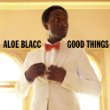To hear Aloe Blacc discuss his music and literary influences is to hear a little Jimi Hendrix philosophizing mixed with a lot of Berkeley liberalism, even though the Southern California grad matriculated far south of that progressive hub. Blacc's left-leaning politics coats his co-penned soul tales with a male-centric, working class social consciousness that owes as much a debt to James Baldwin's The Fire Next Time as it does to Bill Withers' Just Bill and any number of bluesmen for its perennial urban portraits. Though his latest, Good Things, is a highly conventional retro-soul album, one straight out of the Curtis Mayfield playbook, there is an enduring freshness to it.
To hear Aloe Blacc discuss his music and literary influences is to hear a little Jimi Hendrix philosophizing mixed with a lot of Berkeley liberalism, even though the Southern California grad matriculated far south of that progressive hub. Blacc's left-leaning politics coats his co-penned soul tales with a male-centric, working class social consciousness that owes as much a debt to James Baldwin's The Fire Next Time as it does to Bill Withers' Just Bill and any number of bluesmen for its perennial urban portraits. Though his latest, Good Things, is a highly conventional retro-soul album, one straight out of the Curtis Mayfield playbook, there is an enduring freshness to it.
Part of that freshness is owed to elements of funk, country, and hip hop storytelling motifs that can be heard plainly, but movingly sung, on these otherwise traditional R&B Truth & Soul productions. Elbowing his way into territory already owned by Lee Fields, Shawn Lee, Mayer Hawthorne and Sharon Jones & The Dap Kings, the LA soul singer/songwriter Aloe Blacc is playing in a far different lane than the stream-of-consciousness, Afro-Latin hip hop experimentations that marked his 2006 Shine Through solo debut. It is a surprisingly welcome change, and far more accessible than his initial outing in many regards. Its commercial instincts aside, Good Things is also a much more mature and personal Blacc than we were introduced to back in the late ‘90s when he ran with some pretty innovative hip hop crews, including Emanon. Like Phonte of The Foreign Exchange, Blacc has since credibly evolved from underground poet to a traditional soul stylist, without ever losing what made him unique. Both wear their thirty-something age and maturity well, making their graceful genre transitions seem like a natural progression every hip hop head of a certain age should embrace.
Like Phonte, Blacc's straight-forward second tenor is limited in range, but not in sentiment and sincerity. You hear his resounding sensitivity for first person protagonists in Blacc's revelatory bleeding ballads, cautionary tales, and searing testimonies. He shares Anthony Hamilton's penchant for infusing a world-weary spirituality in his lyricism, though with the exception of "Take Me Back," Blacc's songs aren't about man's relationship with God as much as a plea to his fellow man for care and compassion in how we consider one another's trials. "I Need A Dollar," the hip hop syncopated, piano-driven HBO theme for How To Make It In America leads the charge for a quartet of indigo songs about the harrowing social conditions men of limited means face whether during the Depression, in Nixon's harsh 70s, or the newest fiscal nightmare we're in. While "I Need A Dollar" is the catchiest, "Miss Fortune" the cleverest in its metaphorical renderings, the gritty "Life So Hard" is the darkest, and "Take Me Back" hands down boasts the strongest vocal performance here and is the most effective in expressing an increasingly urgent, near claustrophobic relationship with life as experienced by his protagonist. The resolute men Blacc is channeling aren't afraid to share insight into the harsh realities they are striving to survive the best they can, be it economic obstacles or intimate relationships gone awry.
Blacc's plea for love and listener empathy is extended to the women in these hard men's lives on the rollicking shu wop of "Loving You Is Killing Me" and the orchestral dirge of the questioning "If I." In truth, women aren't painted too virtuously in these noir portraits, especially on the slowed-down reimagining of the Velvet Underground's "Femme Fatale," the funky jingle warnings against manipulative women on "Hey Brother," or on the title track, one where all life's "Good Things" came the brother's way AFTER his woman left (So, nah!). Only on "You Make Me Smile" and the devastatingly personal "Mama, Hold My Hand" (what bluesman doesn't love his mama?), does Blacc end this thread of blame, resentment, muted longing and roaring jealousy to celebrate the healing love can be, the glue for survival.
The optimistic "Green Lights" also does its part to break Blacc's clear-eyed cycle of sadness. The muted gem is still no less reality-based in its spot-on reading of how a run of good luck feels from the inside out-the cautious enthusiasm, the fearful, wanting to be boastful joy are all present in Blacc's tone; the harmonic rays of light, and the punchy horns and organ keys all revel in the spell, knowing its all too fleeting nature. It's Blacc's knowing of these interior complexities, his fearless ability to look life straight in the eye and express what he sees without romance - but nonetheless with great clarity and musicality - that is the genius and maturity Blacc realizes on Good Things. Having the privilege to pay witness to it is perhaps the best thing about Good Things. Highly Recommended.
By L. Michael Gipson

